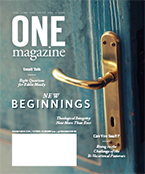
October-
November 2019
New Beginnings
------------------
|





Theological Integrity: Now More Than Ever
By W. Jackson Watts
When the National Association convened in Asheville, North Carolina, 60 years ago, turbulent times loomed on the horizon. The Christian church in America would soon face battles over the Bible, the loosening of sexual standards, and a growing racial divide. But in 1959, Free Will Baptist leaders and delegates determined to prepare our churches. The Commission on Theological Liberalism was the product of this determination.
Later renamed the Commission for Theological Integrity, this group’s specific purpose was to “study the menaces of theological liberalism, secularism, worldliness,” and similar challenges to our spiritual and ministry fidelity (Contact, August, 1959, page 6). Members were challenged to alert their brethren to deceptive trends and equip them to maintain integrity in a fallen world. Through articles, pamphlets, seminars, books, and later symposiums and a website, the commission has been doing just that.
Many Free Will Baptists can’t help but associate the commission with Leroy Forlines, one of Free Will Baptists’ most consequential theologians. Not surprising, since his service spans nearly the length of the commission’s existence. Yet, the first members of the commission included the likes of Eugene Waddell, N.R. Smith, Ronald Creech, Paul Ketteman, and Bobby Jackson. Other notable figures such as Wade Jernigan, J.D. O’Donnell, and Steve Ashby also have served. These men and others dug deeply into our Free Will Baptist heritage, explored various areas of theological scholarship, and paid attention to American society to be best positioned to prepare our churches.
As a long-standing institution in our movement, the commission has maintained a respectable reputation for addressing tough questions. It has played a role in adding clarity to nearly every doctrinal debate we’ve had and confronted every major theological crisis in American Christianity. The list is long: the New Age Movement, ecumenism, the doctrine of Hell, Calvinism, the social gospel, evolution, transgenderism, and much more. In one sense, the commission’s work is reactive: to discern the times and equip our churches and leaders to respond faithfully. However, its work is also proactive. Many questions the commission has addressed are cyclical in nature. The complex theological questions and cultural crises our movement faced in the 1950s, 60s, and 70s have resurfaced this century in new garb. As Mark Twain once quipped, “History doesn’t repeat itself, but it rhymes.” Therefore, having built a foundation of doctrinal understanding around many major issues, the commission has, in fact, provided our people with the tools to prepare for issues that arise in the future.
Since I began serving on the commission in 2013, I have been intrigued to review our materials and records and discover the level of engagement my predecessors had with the problems of the times. I’ve seen careful examination of issues easily distorted in a sound-bite world. I also have been reminded of our charge to help each new generation of church leaders and laymen view these problems with fresh eyes.
As we press deeper into the 21st century, there are two great challenges to our denomination’s commitment to truth, which in turn, influence the commission’s work. The first challenge is we need as much theological integrity in the Internet age as the early church needed in the first century. We must manage the delicate balance between making the wisest use of this incredible tool, while also being aware of its limits and destructive tendencies. The advent of Google has made it possible to learn everything and nothing at the same time. Finding a reliable source for biblical information can be challenging. Occasionally, I Google a question relating to a biblical issue to see what others have said on a subject. What I see often frightens me. If an educated pastor must exercise discernment and caution in his study, how much more is this true for those with less training or who are new to the faith? The Scriptures describe Satan as a liar and deceiver. What better weapon can he wield than a tool we use and depend upon every day?
The prevalence of lies makes the work of the Theological Commission especially significant. In 1959, the resolution that gave birth to our commission called for it to “write informative articles in our publications to warn our people.” Much like Paul told Timothy to warn people of false teaching, the commission is engaged in warning (1 Timothy 1:3). Readers can expect this to continue through both digital and print resources, and at events.
The second challenge we face is related to the first but more subtle. With the first challenge we must learn how to cultivate discernment amid our many forms of media. The second challenge is as much attitudinal as it is intellectual. Sometimes, pastors and layman are apathetic toward theological reflection. This indifference is not rooted in malice. Rather, the pressures and problems of contemporary ministry often force us to think we need another tactic, skill, strategy, or program. This partly explains the prevalence of ministry conferences in evangelical circles. We have conferences on preaching, singing, leadership, and so much more. To be clear, I myself have benefited from such events. However, theology often has been relegated to the sidelines, because many think as long as they have their basic doctrinal beliefs worked out, they can focus on how to “do” ministry. If one can check the right boxes on a statement of faith, he can move on to practical concerns.
This myth about theology is the core of our modern dilemma: we believe thinking and doing are radically different things. However, theology embraces both thought and practice. Theology isn’t a set of statements on a page. It is both a description of God’s truth, and a way of expressing those truths in lived practice.
Somewhere along the way, theology was sidelined by the belief it is only for scholars or academics. To be fair, those engaged in theological scholarship have a burden to bear in this. Just as the “practically-minded” need to think more deeply about how theology should inform practice (and what theology is implied by their current practice), the “intellectually-minded” continually should work out the implications of their theology for the life of and practice of God’s people. In other words, theology is practical and practice is theological.
To illustrate the commission’s commitment to this vision of theology, consider a few things we have been doing. First, a few months ago, our website had a record number of unique visitors for a single day. The topic to which they were drawn was church polity and multi-site churches in an article written by our commission chairman. Second, the most recent seminar hosted by the commission at the National Convention regarded the genetics revolution, and what that has to do with our views of Adam and Eve as real people, free will, and more. Third, the forthcoming symposium October 28-29 will center on the theme of ecclesiology (the doctrine of the Church). I believe these examples illustrate our commitment to the union of theology and practice, doctrine and ministry, truth and life.
The Commission for Theological Integrity is committed to preserving and promoting Free Will Baptist doctrine for 60 more years and beyond, if the Lord tarries His coming. We exist to serve leaders, laymen, and churches. To learn more, visit www.fwbtheology.com, Like us on Facebook, or follow us on Twitter: @fwbtheology.
About the Writer: W. Jackson Watts, Ph.D., is pastor of Grace FWB Church near St. Louis, where he has served since 2011. He is a member of the Commission for Theological Integrity and the clerk of the Missouri State Association. Watts is the author or editor of two books, and writes regularly for the Helwys Society Forum.
|
|

